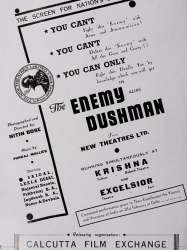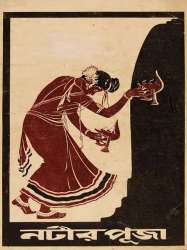New Theatres

- Infos
- Best films
If you like this company, let us know!
Foundation date 10 february 1931
New Theatres is an Indian film studio. It was formed in Calcutta by producer B. N. Sircar (Birendranath Sircar, the recipient of Dadasaheb Phalke Award of 1970). It was formed on 10 February 1931. Motto of this company was– Jivatang Jyotiretu Chhayam (Light infusing shadows with life). Sircar preferred to function
roughly analogous to what in USA was known as an executive producer. He built a processing laboratory... and got around him a devoted band of people.... Having decided on or approved a story or a subject for a film and the team to make it [Sircar] ensured that adequate funds were provided... but refrained from interfering with its execution. He made New Theatres a symbol of Bengali cinema's artistic good taste and technical excellence.
Dena Paona, a Bengali talkie, was released in 1931, directed by Premankur Atarthi and produced by New Theatres. Famous musician Raichand Boral composed for this movie.
According to Kironmoy Raha, "New Theatres made its reputation secure with Chandidas directed by Debaki Bose in 1932," after the studio had produced five talkies.
In 1935, P.C. Barua directed and acted in Devdas, based on Saratchandra Chatterjee's novel Devdas, and this film became phenomenally successful in the industry.
In 1935, playback singing was first used in India in the Bengali film Bhagya Chakra by Nitin Bose. The singers were K C Dey, Parul Ghosh and Suprabha Sarkar. Dhoop Chhaon, Hindi remake of this film, was the first Hindi film to use playback singing.
Kanan Devi was the first popular star actress, who appeared in many films produced by New Theatres. Also there was a group of talented actors with New Theatres like K.L. Saigal, K. C. Dey, Prithviraj Kapoor, Chhabi Biswas, Bikash Roy, Pahari Sanyal, Basanta Choudhury.
Top directors like Premankur Atarthi, P.C. Barua, Debaki Bose and Nitin Bose worked in New Theatres films. The Famous musicians who worked there include R. C. Boral, Pankaj Mullick and Timir Baran.
Filmography of New Theatres (11 films)
Production
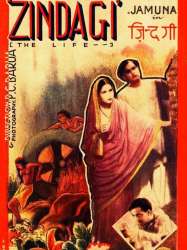
Zindagi (1940)
, 2hDirected by P.C. Barua
Genres Drama
Actors Riya Sen, Kundan Lal Saigal, Jamuna Barua, Pahari Sanyal, Jamuna, Manorama

Street Singer (1938)
, 2h15Directed by Phani Majumdar
Genres Drama
Actors Kundan Lal Saigal, Kanan Devi
Bhulwa helps Manju escape from a burning orphanage and from the care of the tyrannical manager of the orphanage. The two street urchins go from village to village, singing and making money. Bhulwa’s big dream is to someday sing in a theatre in Calcutta. Several years later both are singing on the streets in Calcutta and Manju (Kanan Devi) is employed by a theatre to sing. Bhulwa (K. L. Saigal) encourages her through her nervousness and she becomes a popular singer. However her attitude towards servants and other people changes and Bhulwa is disappointed and tells her off. Bhulwa is still struggling but manages to get a chance to sing on the radio. Manju comes to know of his singing assignment when she listens to him sing on the radio. Feeling slighted she decides to sing Bhulwa’s song in a new style, the way the actor-manager Kailash wants. She leaves a message with the servant asking him to send Bhulwa to the theatre. Bhulwa gets drenched in the rain and is feverish but he goes to listen to Manju. On hearing the new tune given to his favourite song he gets aggressive on the stage and then leaves from there. Manju by now is repentant and decides to search for him. She asks the manager-actor Kailash to drive her and searches the roads by which both had travelled to come to the city. She spies Bhulwa in a boat which is being tossed around due to the wind and storm. The boat crashes against the banks. Manju rushes to Bhulwa and cradles his head on her lap. Kailash leaves them, while both look towards the road leading to the village.
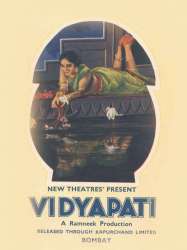
Vidyapati (1937)
, 2h21Genres Drama, Romance
Actors Pahari Sanyal, Kanan Devi, Chhaya Devi, Prithviraj Kapoor, Krishna Chandra Dey
King Shiva Singha (Prithviraj Kapoor) and His queen Lakshmi (Chhaya Devi) invite the poet Vidyapati (Pahari Sanyal) to their palace. He arrives with his constant companion Anuradha (Kanan Devi). The queen finds herself getting attracted to Vidyapati’s poetry and falls in love with him. This causes great anguish to the king who in his distress abandons his responsibilities and turns to Anuradha. The troubled Queen decides to kill herself and when the Prime Minister gets to hear of it he encourages her as he feels that Vidyapati’s sensuous bold poetry has had a detrimental effect on the king. The king in the end sends for his queen through Anuradha. Standing near the statue of Shiva, the king and queen consume poison.

Dharti Mata (1937)
, 2h45Directed by Nitin Bose
Actors Kundan Lal Saigal, Krishna Chandra Dey
Ashok (K. L. Saigal) and Ajay (Jagdish Sethi) have different notions about the progress of the country. Ashok supports agriculture and going back to the villages while Ajay is in favour of industrialisation and technology. Ajay is from a rich family and has to go to UK for further studies in engineering. He asks Ashok to come with him. Ashok refuses and decides to go the village and help the farmers. Ajay’s sister Pratibha (Kamlesh Kumari) is in love with Ashok who is unaware of her feelings. When Ashok faces hardships in the village she secretly assists him by sending money to buy new machinery for the farm. Ashok and his colleague are frustrated in their attempts several times by Chowdhary, the village headman. Ashok meets and falls in love with a village girl Gauri (Uma Shashi) who stays with her blind father (K. C. Dey). Ajay returns from abroad and is told of a rich coal mine. This is located under Ashok’s field. Ajay forgoes mining the land and decides to buy the land that Ashok has been farming to safeguard it for him. Ashok tells Ajay his plans of marrying Gauri. Ajay is stunned and upset for his sister. For the farmers there is distress when the monsoons fail. They face a drought situation. This is when Ajay decides to mine the field for coal. However the disagreements are sorted out and Ajay helps out with new ideas and approves Ashok’s method of co-operative farming.
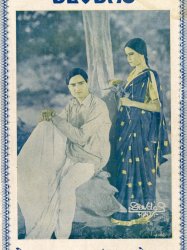
Devdas (1936)
, 2h19Directed by P.C. Barua
Genres Drama, Romance
Themes Films about alcoholism, Medical-themed films, Films about music and musicians, Films about drugs, Films about sexuality, Erotic films, Films about prostitution, Musical films, Bollywood
Actors Kundan Lal Saigal, Jamuna Barua, P.C. Barua, Thanjavur Ranganayaki Rajakumari, Rajkumari, Phani Sarma
Devdas (K. L. Saigal) falls in love with Parvati (Jamuna) with whom he has played since childhood and who is the daughter of a poor neighboring family. Devdas goes away to Calcutta for University studies. Meanwhile, Parvati's father arranges her marriage to a much older man. Though she loves Devdas, she obeys her father to suffer in silence like a dutiful Hindi wife. Devdas as a result takes to drink. Chandramukhi (Rajkumari), a dancing girl or 'prostitute' he has befriended in Calcutta, falls for him and gives up her profession to try to save him. Parvati, hearing of his decline, comes to see him to steer him away from a life of drinking. Devdas sends her back saying in his hour of final need he will come to her. She returns to her life of duty. Realising his end is near, Devdas decides to keep his promise and meet Parvati. He journeys all night, reaches her house and is found dead outside the high walls of her house. Inside Parvati hears that Devdas is dead.
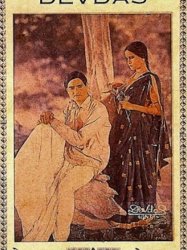
Devdas (1935)
, 2h19Directed by P.C. Barua
Genres Drama
Themes Films about alcoholism, Medical-themed films, Films about music and musicians, Films about drugs, Films about sexuality, Erotic films, Films about prostitution, Musical films
Actors P.C. Barua, Jamuna Barua, Chandrabati Devi, Kundan Lal Saigal, Jamuna, Krishna Chandra Dey
The son of Zamindar Narayan Mukherjee, Devdas was born with a silver spoon in his mouth. He grew up in the lush village of Taj Sonapur, where he spent his childhood, indulged by his lovely playmate Paro. They grew up sharing a special relationship, in which they existed only to each other. Oblivious of all the differences of status and background, a bond that would never break grew between them. Slowly, it changed to love but it was still unsaid. But the reverie was broken when his family sent Devdas to Calcutta for education. Paro's world crashed knowing that her Devdas would be gone and she lit a diya, for it signified the fast coming back of her loved one. Years passed and Devdas returned. Devdas was besotted by her stunning beauty and longed to have her back. But Zamindar Narayan Mukherjee, Devdas' father, met Paro's mother Sumitra's marriage proposal with condescending arrogance. It caused a rift between the families and even though Devdas tried to convince his father, only antagonism came his way. Finally, he moved away from Paro and wrote a letter to her, asking her to forget him. Only, he didn't realize that he would never be able to forget her ever. And much later, when he reached out to her, it was too late as she was far too humiliated. She scorned him for not standing by her and they parted forever with a heart-broken Paro entering into a chaste marriage with a wealthy, much older man, Zamindar Bhuvan, while a shattered Devdas walked towards anguish, alcoholism & Chandramukhi. Chandramukhi, a stunning courtesan instantly lost her heart to Devdas. A unique bond was formed between both as he could share with her the intense pain of his unfulfilled love for Paro. Meanwhile, Paro, on the other hand, performed her worldly duties sincerely, but inside her heart, she could never forget Devdas for a moment. Strange was the fate of Devdas. Intensely loved by two women, who were never meant to be his.

Manzil (1935)
, 2h24Directed by P.C. Barua
Actors Jamuna Barua, Pahari Sanyal, Prithviraj Kapoor
Mahim and Suresh are childhood friends, both in love with Achala. Suresh is rich but adheres to conventional values while Mahim is from a poor family but well-educated. Achala has been given a liberal Brahmo Samaj upbringing. Though fond of both friends, she chooses to marry Mahim and they shift to a village. Achala gradually becomes dissatisfied. Their house burns down and Mahim falls ill. Suresh arrives to nurse Mahim back to health and goes with them to a health resort for Mahim to recover. Achala is attracted to Suresh and they both elope. She later returns to Mahim who forgives her.

Roop Lekha (1934)
, 2h1Directed by P.C. Barua
Genres Drama, Documentary, Historical
Actors Kundan Lal Saigal, P.C. Barua, Pahari Sanyal, Noor Mohammed Charlie, Jamuna Barua, Ahindra Choudhury
 Connection
Connection
